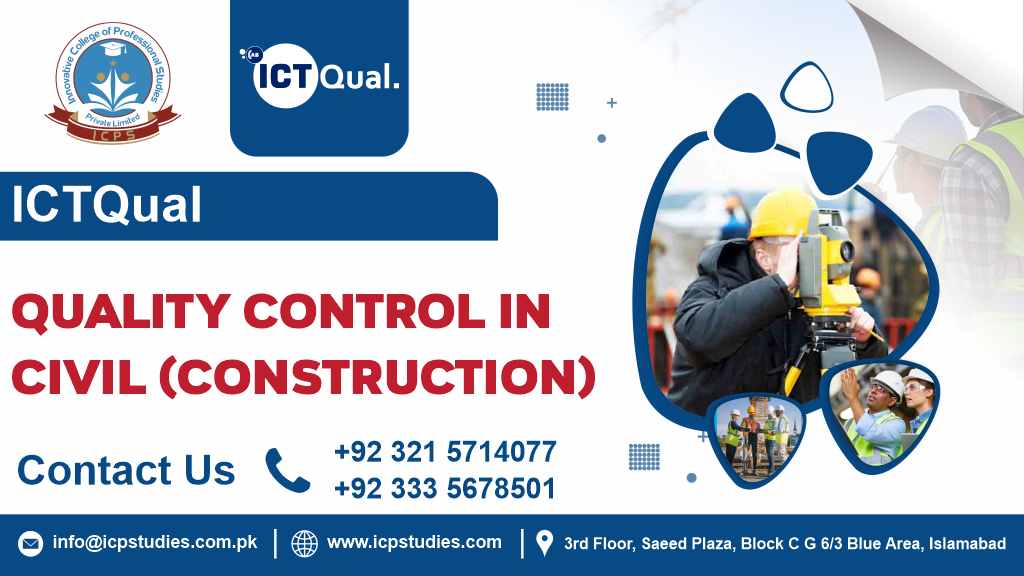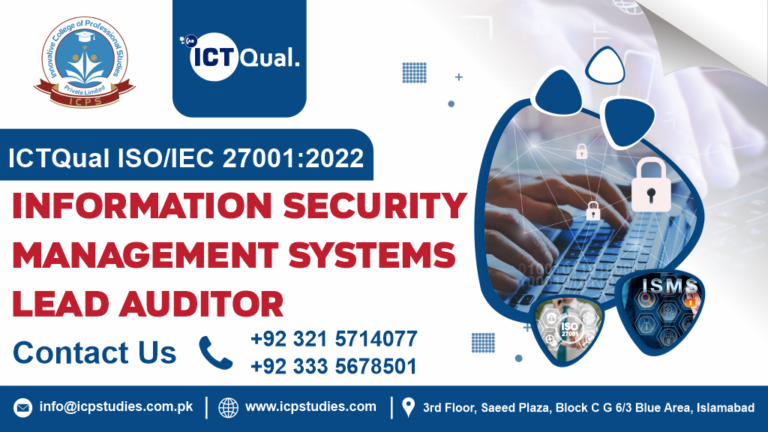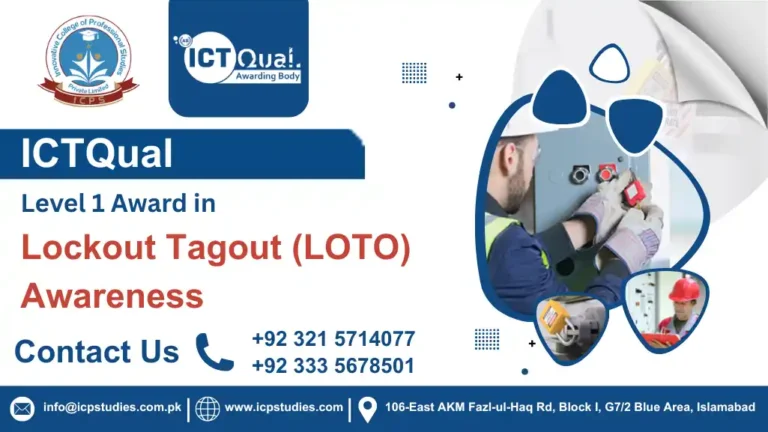Quality control in civil construction plays a pivotal role in ensuring that infrastructure projects meet stringent standards of safety, durability, and functionality. From bridges and roads to buildings and dams, every construction endeavor requires meticulous oversight to deliver projects that withstand the test of time and meet client expectations.
quality control is integral to the success and sustainability of civil construction projects. It involves comprehensive planning, meticulous execution, and continuous monitoring to ensure adherence to standards, compliance with regulations, and delivery of high-quality infrastructure. By investing in robust quality control practices, the construction industry not only safeguards public safety and environmental integrity but also enhances its reputation for excellence and reliability in delivering infrastructure solutions for communities worldwide.
All About ICTQual Quality Control in Civil (Construction)
Course Overview
Quality Control in Civil Construction refers to the systematic process of ensuring that construction activities, materials, and finished structures meet specified standards and requirements. It encompasses various techniques, procedures, and protocols aimed at maintaining and enhancing the quality of construction projects, thereby ensuring safety, durability, functionality, and compliance with regulatory standards.
Quality Control in Civil Construction is essential for delivering infrastructure projects that are safe, durable, and compliant with regulatory requirements. By implementing rigorous testing, inspection, and documentation practices, construction professionals ensure that buildings, bridges, roads, and other structures meet high standards of quality and reliability. This not only protects public safety but also enhances the reputation and credibility of the construction industry in delivering sustainable and resilient infrastructure solutions.
Study Units
- Introduction to Quality Control in Civil Construction
- Quality Standards and Regulations
- Quality Assurance Processes
- Inspection Techniques and Methods
- Documentation and Reporting
- Problem-solving and Corrective Actions
- Risk Management in Quality Control
- Communication and Stakeholder Management
The entry requirements for the ICTQual Quality Control in Civil (Construction) course typically include:
- Age Requirement: Participants must be at least 18 years old.
- Educational Background: A basic understanding of civil engineering or construction principles is recommended.
- Basic Literacy and Numeracy: Competence in reading, writing, and basic math skills to comprehend course materials and assessments.
- Relevant Work Experience: Experience in the construction industry or related fields can be beneficial but is not always mandatory.
- Health and Safety Awareness: A general understanding of health and safety practices relevant to construction sites.
- Registration: Completion of necessary registration forms and payment of any applicable fees.
Always check with the specific training provider for any additional or specific entry requirements, as they can vary.
4o mini
The ICTQual Quality Control in Civil (Construction) course is designed for:
- Quality Control Inspectors: Individuals responsible for ensuring that construction projects meet quality standards and specifications.
- Civil Engineers: Engineers looking to enhance their understanding of quality assurance practices in civil engineering and construction.
- Site Supervisors and Managers: Those overseeing construction sites who need to ensure compliance with quality control measures.
- Construction Technicians: Technical staff involved in the inspection and testing of construction materials and processes.
- Project Managers: Professionals managing construction projects who require knowledge of quality control to deliver successful outcomes.
- New Entrants: Individuals starting a career in the construction industry who want foundational knowledge in quality control practices.
This course equips participants with essential skills and knowledge to maintain and improve quality standards in civil engineering and construction projects.
Learning Outcomes
Introduction to Quality Control in Civil Construction
- Understand the fundamental concepts and importance of quality control in civil construction projects.
- Identify key stakeholders involved in quality control processes and their roles.
- Recognize the impact of quality control on project success, safety, and compliance.
2. Quality Standards and Regulations
- Gain knowledge of relevant quality standards, building codes, and regulatory requirements applicable to civil construction projects.
- Interpret and apply standards to ensure compliance and quality assurance throughout project phases.
- Discuss the consequences of non-compliance and the importance of adhering to industry-specific regulations.
3. Quality Assurance Processes
- Understand the systematic procedures and methodologies used to implement quality assurance in civil construction.
- Develop skills in planning, monitoring, and evaluating quality control measures to ensure project quality and performance.
- Implement quality assurance practices to mitigate risks and optimize construction processes.
4. Inspection Techniques and Methods
- Learn various inspection techniques, tools, and methods used in civil construction to assess workmanship and materials.
- Apply inspection protocols to identify defects, deviations, and potential hazards during construction activities.
- Utilize inspection data to make informed decisions and ensure compliance with quality standards.
5. Documentation and Reporting
- Understand the importance of accurate documentation and reporting in quality control processes.
- Develop skills in recording inspection findings, test results, compliance issues, and corrective actions.
- Communicate effectively through clear and concise documentation to stakeholders and regulatory authorities.
6. Problem-solving and Corrective Actions
- Develop problem-solving skills to address quality issues, defects, and non-conformities in civil construction projects.
- Implement corrective actions and preventive measures to rectify deficiencies and improve project outcomes.
- Analyze root causes of quality-related problems and develop strategies to prevent recurrence.
7. Risk Management in Quality Control
- Identify potential risks and hazards associated with quality control in civil construction.
- Apply risk assessment techniques to prioritize and mitigate risks throughout the project lifecycle.
- Implement risk management strategies to enhance project resilience and minimize disruptions.
8. Communication and Stakeholder Management
- Enhance communication skills to effectively convey quality control requirements, issues, and progress to project stakeholders.
- Manage stakeholder expectations and relationships through transparent communication and collaboration.
- Foster a culture of quality and continuous improvement by engaging stakeholders in quality control processes.
FAQs about ICTQual Quality Control in Civil (Construction)







